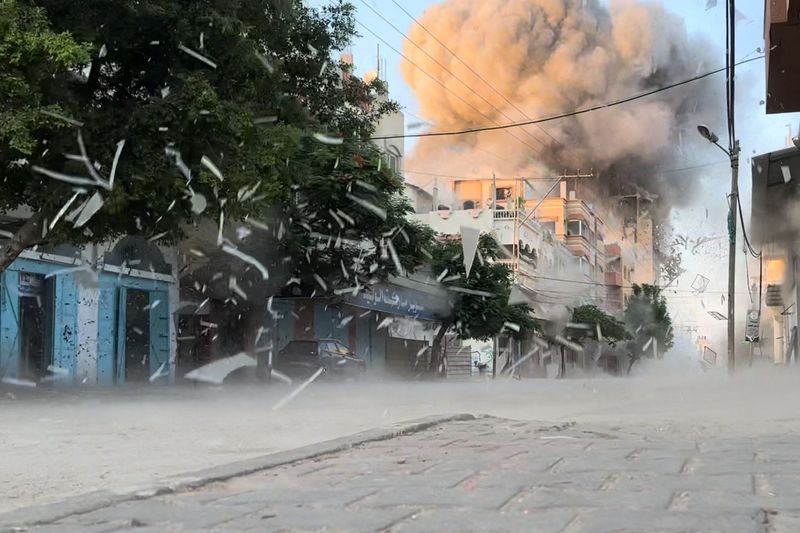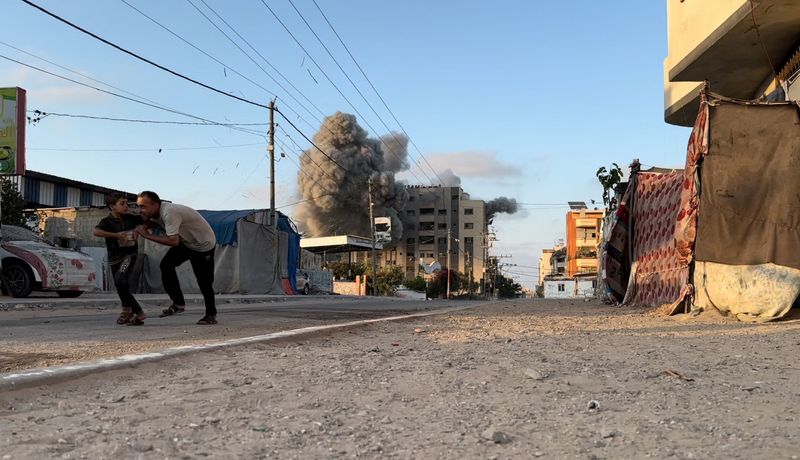By Humeyra Pamuk
TEL AVIV (Reuters) - U.S. Secretary of State Antony Blinken arrived in Tel Aviv on Sunday on another Middle East tour to push for a ceasefire in Gaza but Hamas raised doubts about the mission just hours after he landed by accusing Israel of undermining his efforts.
The Palestinian militant group said it holds Israeli Prime Minister Benjamin Netanyahu responsible for "thwarting the mediators' efforts", delaying an agreement and exposing Israeli hostages in Gaza to the same aggression faced by Palestinians.
On his ninth trip to the region since the war began in October, Blinken will meet on Monday with senior Israeli leaders including Netanyahu, a senior State Department official said.
After Israel, Blinken will continue onto Egypt.
The talks to strike a deal for a truce and return of hostages held in Gaza were now at an "inflection point", a senior Biden administration official told reporters en route to Tel Aviv. "We think this is a critical time," the official said.
The mediating countries - Qatar, the United States and Egypt - have so far failed to narrow enough differences to reach an agreement in months of on-off negotiations, and violence continued unabated in Gaza on Sunday.
Israeli strikes killed at least 21 people in Gaza on Sunday, Palestinian health authorities said, including six children and their mother in an airstrike on a house in the central city of Deir Al-Balah. The youngest was aged 18 months, their grandfather Mohammed Khattab told Reuters as relatives later gathered around the bodies, wrapped in white shrouds.
"What was their crime? ... Did they kill a Jew? Did they shoot at the Jews? Did they launch rockets at the Jews? ... What did they do to deserve this?" asked Khattab.
There was no immediate comment from the Israeli military. Israel has denied targeting civilians as it hunts down Hamas militants, accusing the group of operating from civilian facilities including schools and hospitals. Hamas denies this.
The Israeli military said it destroyed rocket launchers used to hit Israel from the southern Gaza city of Khan Younis, the scene of intense fighting in recent weeks, and killed 20 Palestinian militants.
In the occupied West Bank, where violence has escalated since the war in Gaza broke out in October last year, an Israeli man died from wounds sustained in an attack, according to a hospital spokesperson.
CLOSING GAPS
The talks towards a ceasefire are set to continue this week in Cairo, following a two-day meeting in Doha last week. Blinken will try to secure a breakthrough after the U.S. put forward bridging proposals that the mediating countries believe would close gaps between the warring parties.
The war erupted on Oct. 7 when Hamas militants rampaged into Israel, killing around 1,200 people and seizing around 250 hostages, according to Israeli tallies.
Israel's subsequent military campaign has killed more than 40,000 Palestinians, mostly civilians, according to Palestinian health authorities, and reduced much of Gaza to rubble. Israel says it has killed 17,000 Hamas combatants.
There has been increased urgency to reach a ceasefire deal amid fears of escalation across the wider region. Iran has threatened to retaliate against Israel after the assassination of Hamas leader Ismail Haniyeh in Tehran on July 31.
Israel remained firmly committed to principles established for its security in the May 27 outline proposals, Netanyahu's office said in a statement following a meeting of the cabinet.
"I would like to emphasise: We are conducting negotiations and not a scenario in which we just give and give," Netanyahu told the meeting. "There are things we can be flexible on and... things that we cannot be flexible on, which we will insist on."
Netanyahu's office said he still insists Israeli forces remain on a border strip that runs between Gaza and Egypt known as the Philadelphi Corridor, in order to prevent weapons being smuggled into Gaza.
It said Netanyahu would continue to work towards advancing a deal that maximizes the number of living hostages released and allows for Israel's war objectives to be achieved, including not allowing Hamas to retain control of Gaza.
Hamas said that optimistic U.S. comments were "deceptive" and accused Netanyahu of making new conditions in an attempt to "blow up" the negotiation.

Disagreements include whether Israeli troops should remain present in Gaza after the fighting ends, notably along the border with Egypt, and over checks on people going into northern Gaza from the south which Israel says is needed to stop armed militants.
Hamas has pushed for a ceasefire deal to end the war, while Israel has not been willing to agree to go beyond a temporary pause in the fighting.
